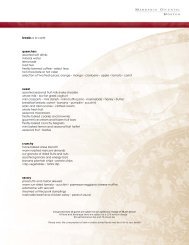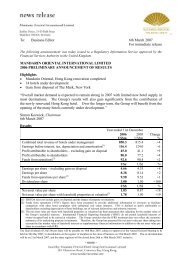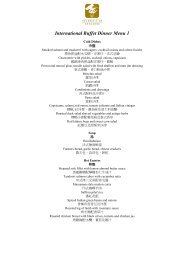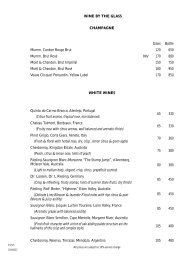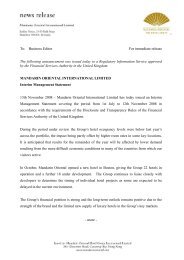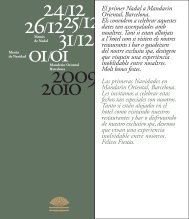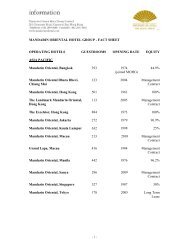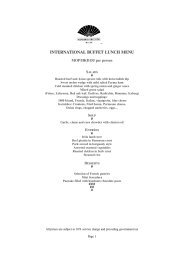Annual Report 2011 - Mandarin Oriental Hotel Group
Annual Report 2011 - Mandarin Oriental Hotel Group
Annual Report 2011 - Mandarin Oriental Hotel Group
Create successful ePaper yourself
Turn your PDF publications into a flip-book with our unique Google optimized e-Paper software.
Principal Accounting Policies<br />
<strong>Annual</strong> <strong>Report</strong> <strong>2011</strong> 31<br />
A Basis of preparation<br />
The financial statements have been prepared in accordance with International Financial <strong>Report</strong>ing Standards,<br />
including International Accounting Standards and Interpretations adopted by the International Accounting Standards<br />
Board. The financial statements have been prepared under the historical cost convention except as disclosed in the<br />
accounting policies below.<br />
Standards, amendments and interpretations effective in <strong>2011</strong> which are relevant to the<br />
<strong>Group</strong>’s operations<br />
Revised IAS 24 Related Party Disclosures<br />
Amendments to IFRIC 14 Prepayments of a Minimum Funding Requirement<br />
IFRIC 19 Extinguishing Financial Liabilities with Equity Instruments<br />
Improvements to IFRSs (2010)<br />
The adoption of these standards, amendments and interpretations does not have a material impact on the <strong>Group</strong>’s<br />
accounting policies.<br />
Revised IAS 24 ‘Related Party Disclosures’ supersedes IAS 24 (as revised in 2003). It simplifies the disclosure<br />
requirements for government-related entities and clarifies the definition of a related party.<br />
Amendments to IFRIC 14 ‘Prepayments of a Minimum Funding Requirement’ require an entity to recognize an asset<br />
for a prepayment that will reduce future minimum funding contributions required by the entity.<br />
IFRIC 19 ‘Extinguishing Financial Liabilities with Equity Instruments’ provides guidance on the application of IAS 39<br />
and IAS 32 when an entity issues its own equity instruments to extinguish all or part of a financial liability.<br />
The Improvements to IFRSs (2010) comprise a number of non-urgent but necessary amendments to IFRSs.The<br />
amendments which are relevant to the <strong>Group</strong>’s operations include IFRS 3 (amendments) ‘Business Combinations’,<br />
IFRS 7 (amendments) ‘Financial Instruments: Disclosures’, IAS 1 (amendments) ‘Presentation of Financial<br />
Statements’ and IAS 34 (amendments) ‘Interim Financial <strong>Report</strong>ing’.<br />
IFRS 3 (amendments) ‘Business Combinations’ clarify the transition requirements for contingent consideration from<br />
business combinations that occurred before the effective date of the revised IFRS, the measurement of non-controlling<br />
interests and un-replaced and voluntarily replaced share-based payment awards.<br />
IFRS 7 (amendments) ‘Financial Instruments: Disclosures’ emphasize the interaction between qualitative and<br />
quantitative disclosures and the nature and extent of risks associated with financial instruments.<br />
IAS 1 (amendments) ‘Presentation of Financial Statements’ clarify that entities may present the required reconciliations<br />
for each component of other comprehensive income either in the statement of changes in equity or in the notes to the<br />
financial statements.<br />
IAS 34 (amendments) ‘Interim Financial <strong>Report</strong>ing’ provide guidance to illustrate how to apply disclosure principles<br />
in IAS 34 and add disclosure requirements around the circumstances likely to affect fair values of financial instruments<br />
and their classification, transfers of financial instruments between different levels of fair value hierarchy, changes in<br />
classification of financial assets and changes in contingent liabilities and assets.



